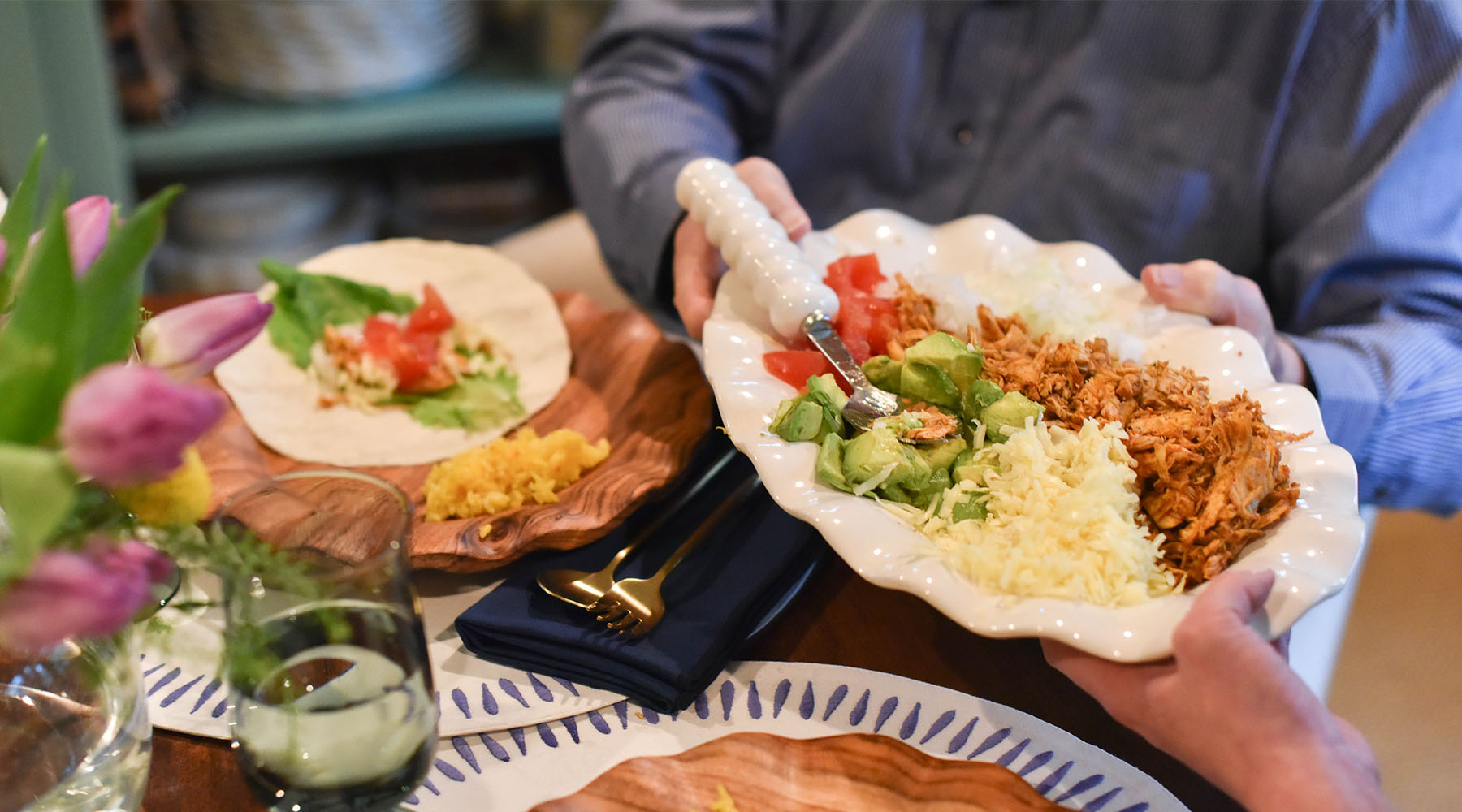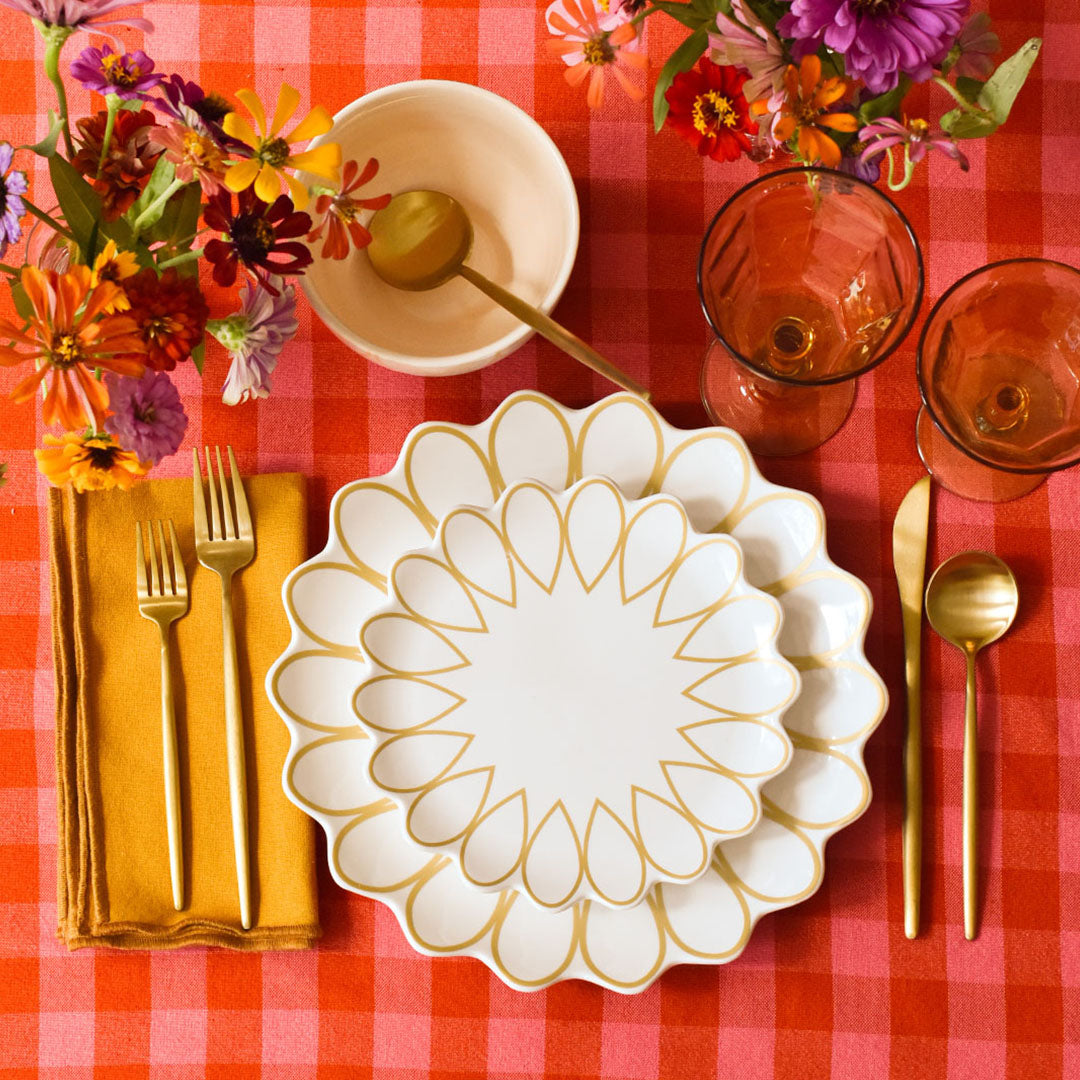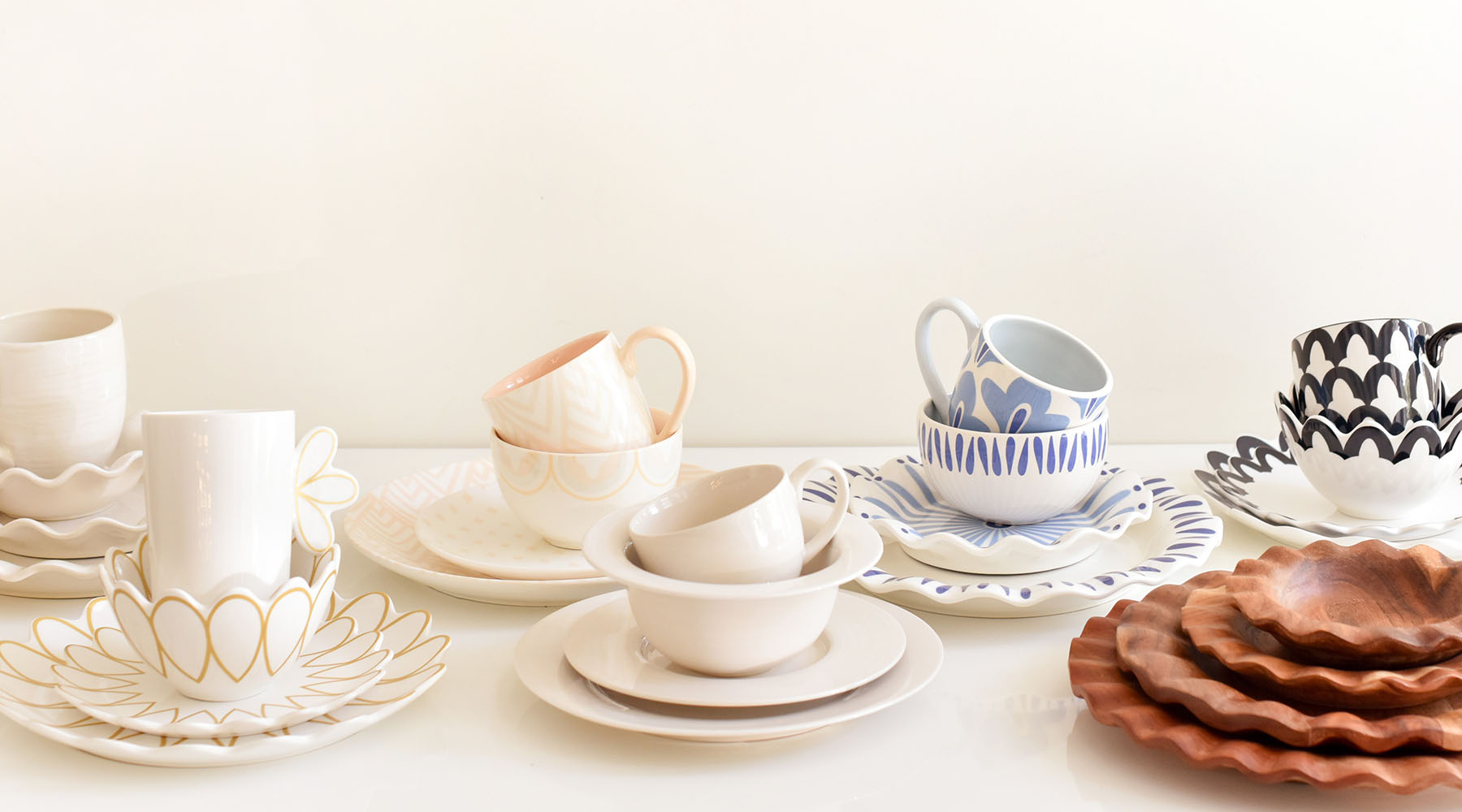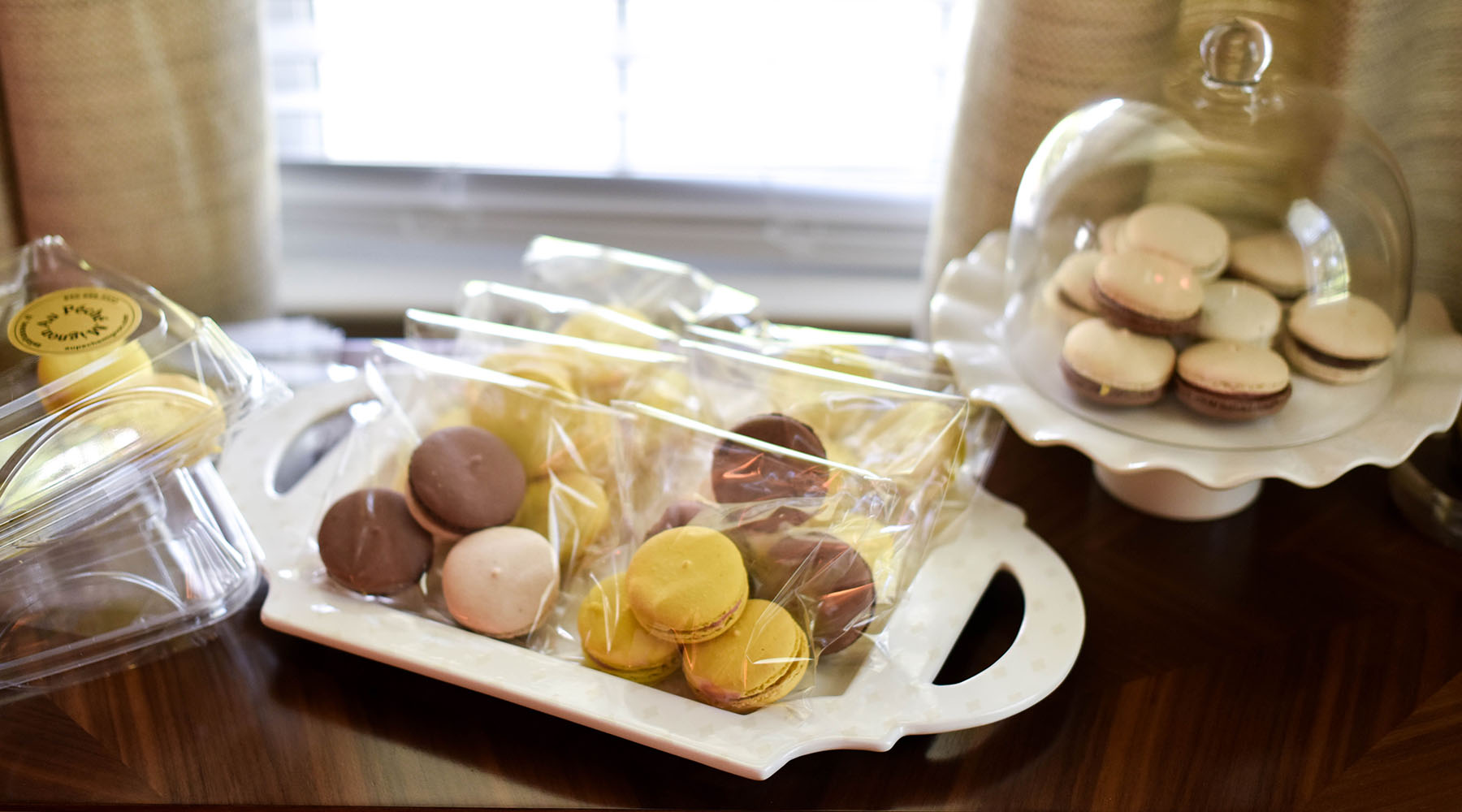
The Benefits and Basics of Hosting a Family-Style Dinner
Family-style serving is one of our favorite ways to host intimate and casual gatherings. By focusing on ease of serving, variety, large portions, and visual appeal, you can create a memorable dining experience that really bonds everyone seated around your table. Learn how to plan and serve family-style meals so you can create your own special moments with the ones you love.
What is Family-Style Serving?
For family-style dinners, the serving platters and bowls of food are placed in the center of the dining table for guests to pass around as they serve themselves. Family-style serving encourages conversation and interactivity as everyone hands delicious offerings down the line and selects their own portions.
This serving style is typically more informal and relaxed compared to formal, plated dinners but more elaborate than a buffet menu. It creates a warm, welcoming atmosphere where people can chat easily, using the food selection as a starting point to share their preferences and swap stories while passing dishes around. It also allows guests to try new foods, giving them the option to place just a taste on their plates.
Why We Love Serving Dinner Family-Style
At the heart of having a family-style dinner is the concept of sharing. The very act of guests passing around platters filled with lovingly prepared food creates a sense of togetherness and community. This is something that we like to foster at our own table among our friends and family.
A family-style dinner is perfect for gatherings where the focus is on enjoyment and socializing rather than strict dining etiquette. This allows us to host spontaneously and gives us lots more flexibility when entertaining. It also offers the opportunity for the host to engage more meaningfully with their guests because:
- Guests serve themselves, and then in turn interact with and pass a dish to a neighboring guest, which creates a more dynamic dining environment that fosters lively conversations.
- Guests choose their portions which eliminates the need for precise portioning by the host, allowing for a more laid-back meal experience.
- Family-style means there are more dishes on the table at a time, which provides an additional opportunity for curating a layered look with style, shape, and color of dinnerware, platters, and more.
5 Additional Benefits of Serving a Dinner Family-Style
Family-style dining is a beloved family tradition for many. Cultures around the globe emphasize the ritualistic aspect of a shared meal, such as how family and friends enjoy Tapas together in Spain or Italy’s passing of communal pots and plates around tables. There are several benefits to using this serving style, including:
- The food served is always fresh and hot since it comes out at the same time.
- You can show off your favorite serving dishes at the table {try our coordinating Dinnerware Collections that offer everything you need, from serving platters to bowls to coordinating cookware and bakeware so you can take your favorite recipes from freezer to oven to table}.
- All guests serve themselves, which allows autonomy and can inspire people to try new things.
- Serving a dinner family-style encourages bonding between guests as they share stories and socialize.
- It allows the host extra time to engage in more in-depth conversations with their guests.
Best Occasions for Family-Style Dinners
A family-style dinner is perfect for those long meals in which people linger around the table, really enjoying one another, the conversation, and the design of the tablescape they’re immersed in. These meals are casual but intimate — inspiring beautiful memories of the recipes and tablescape. That means they work especially well for occasions like:
- Birthday dinners and parties
- Holiday meals {especially Thanksgiving}
- Family dinners
- Brunch
- Summer cookouts
- Casual weeknight dinners {like a Spontaneous ¡Salud! Gathering}
3 Steps to Serving a Family-Style Dinner
1. Create the Family-Style Dinner Menu
In order to decide on serving your menu family-style, you must first ensure the recipes selected are suitable for this serving style... or better yet - specially select recipes that work for family-style serving! Since all the dinnerware, serving platters, and other accouterments are organized around your menu, that's why we suggest starting there before choosing the dishes you plan to set your table with.
Yes, décor plays an important role and elevates the beauty of your spread, but the menu becomes your gathering’s foundation. It coordinates with all of the other decisions for the event — from theme to dinnerware to the general aesthetic you create.
What Types of Recipes Work Best for Family-Style Dining?
When you organize a family-style dinner, you want dishes that are both practical and personal. Plan for food that varies in color, shape, and taste — so it looks enticing and is appropriate for sharing among guests with diverse preferences. Because of the personal nature of family-style serving, try including recipes that have been passed down for generations to preserve your family tradition and add to your story each time they are served, making the meal feel more meaningful.
When planning your meal, consider:
Recipes that are easy to prepare: Preparing family-style dishes should be fairly straightforward. Recipes that require minimal fuss and that are easily made during your party prep timeline are best so they’re all ready to serve at the same time as guests are seated at the table. This allows you to spend more time enjoying the company of your loved ones and less time in the kitchen.
Recipes that can be produced in big batches: Family-style recipes are designed to feed a crowd, so they need to be scalable. Opt for dishes that are easily doubled or tripled, ensuring there's plenty for everyone.
Foods that are easy to serve: Family-style meals should be easy to serve and share. Recipes that can be portioned out with a single serving utensil, such as casseroles, large salads, or platters of roasted vegetables, are ideal. The food should be served on appropriate serveware that’s easy to pass around the table without making a mess.
Dishes that require little-to-no individual assembly: Since family-style serving requires picking up and passing platters, bowls, and plates — it’s important to make sure your menu consists of recipes that don’t require too much construction {you never want an assembly line at the table}.
Our Favorite Recipes for Family-Style Meals
We have a trove of tried-and-true recipes that we share with you each week to help make hosting and gathering together with your family over a meal easier, and many of them are perfectly suited for serving family style. When you are serving dinner family-style, you can opt for several courses — that way, you can extend the conversation … and the good times, so here are a few suggestions organized by course:
Salads:
Sides:
- Vibrant Vegetable Tian Recipe
- Spinach Madeleine Recipe
- G-Daddy's Favorite Baked Beans Recipe
- Fresh Tomato Tart Recipe
Mains:
- Make-Ahead Enchiladas
- Grilled Flank Steak, Charred Corn, and Avocado With Simple Herb Sauce Recipe
- Cumin Spiced Pulled Pork Recipe
- Beef Bourguignon Recipe
- Sage Crusted Rib Roast Recipe {Note: pre-slice and present this course on a serving platter with a serving fork so guests can serve themselves easily}
Pro Tip: If your recipe allows, plate this course before your guests arrive, and then keep the dishes in your oven, setting it at a low temperature so you are free to be with your guests until it's time to sit down at the table to eat.
Desserts:
Pro Tip: Choose desserts that maintain their form at room temperature and are easy to pass around. A frothy, multi-layered cake, for example, tastes wonderful but could wobble on a platter. Try to have at least one treat that offers the “wow” factor that can spark conversation.
2. Select Your Serveware and Dinnerware Settings
When choosing the dishes for serving dinner family-style, you want to consider a few factors:
- Number of guests attending
- Type of food served
- The formality of the gathering
- The event’s style and tone
All of these elements will inform your selection process. For example, the number of guests may dictate the number of dinnerware settings needed and size of serveware. Some foods containing a sauce or syrup might require a dipping bowl or tray with a rim high enough to prevent spills. Evaluate your courses and look at the practical application of serving, ensuring that your guests can pass platters without mishap.
You’ll also want to think about what the décor should look like: will you have a theme? What about a certain color scheme? If you are hosting a seasonal gathering versus an everyday affair, embrace opportunities to bring dishes with fun, seasonal flair like our Christmas in the Village platter or heart cocktail napkins.
Must-Have Serveware for Family-Style Dining:
- Serving platters
- Serving bowls
- Utensils
- Serving boards
- Bakeware
- Table accessories
- Table linens
- Dish sets
What Dishes Can Be Put on the Table During Family-Style Serving?
You can use any dishes for family-style serving; the key is to match them to the requirements of your meal. Be aware of how many platters you need to serve your meal. Lay these out in a trial run prior to the occasion and estimate how much room they take up. Play with the plate setting and serveware to ensure everything fits the way you want. Then, decide what other table elements, like a centerpiece, you might include.
3. Add Accessories to your Tablescape
After you have a basic layout idea, you can add additional table accessories to match the theme or add character to your table. Table décor, like a simple floral arrangement or candles, creates a warm, inviting atmosphere.
Start with the linens and work from there. You can elevate the vibe by adding candles and other personal touches your guests might appreciate, like our delightful Citrus Lemon Toothpick Holder for summertime dinner parties.
Table Accessories for your Table Setting:
- Napkins: Cloth napkins in coordinating colors.
- Vases: Add a fresh floral bouquet with seasonal favorites to your table with a vase as the centerpiece.
- Candle Holders: Pair with a candle holder set with your centerpiece for a show-stopping table.
Fun Ways to Spruce Up a Family-Style Tablescape
Making dinnertime into something special that promotes togetherness is an art. Every detail plays a part, from the food served to the centerpiece to the dishes chosen. To set the table properly for serving a dinner family-style, you should consider playing with layers and adding centerpieces.
When it comes to centerpieces, even the most casual occasions benefit from inviting elements that tie the table together. If scented candles or fragrant blooms aren’t your style, potted plants or unscented candles perched on candle holders can ensure the food’s aroma isn’t masked.
Our Best Tips and Tricks for Family-Style Dinners
We enjoy serving dinner family-style and host many meals like this annually. To make these gatherings seamless and enjoyable, here are some of our best tips and tricks:
Prep ahead: To minimize stress on the day of the gathering, prepare as much as possible in advance. Chop vegetables, marinate meats, and even pre-cook some dishes that can be easily reheated or served cold.
Encourage help: Don’t hesitate to ask for help from family and friends. Whether it’s setting the table, serving dishes, or clearing the table, involving others can make the dinner more enjoyable and less stressful for the host {you!}.
Delay clean up: There’s nothing that can bring a good time to a screeching halt like a host getting up to start cleaning after the last bite has been eaten. It sends the message to your guests that the party is over, and it’s time to leave. Instead, try to clean as you cook to minimize the dishes left after dinner. If guests insist, just assign one or two people the task of clearing the dishes off the table. Then, make your way back to the table with dessert in hand!
When Should You Not Serve Family-Style?
Family-style dining is best for casual scenarios in which you want to facilitate table conversations with an intimate group. When it comes to formal events or parties with huge guest lists, you should skip the family-style meal. Formal affairs are perfect for plated dinners, and large parties run smoothly with buffet-style setups.
Should Appetizers Be Served Family-Style?
Appetizers, hors d’oeuvres, or starter courses are best served while guests are mingling and before they’re seated at the table. Serving them family-style requires everyone to sit prematurely. Offering a self-serve buffet or passed trays usually creates a better environment because doing this allows any latecomers to enter the party without any awkwardness since no one is at the table yet. This precursor course can also give you a little extra time to prepare the meal.
Should Dessert Be Served Family-Style?
Dessert actually works well when you serve dinner family-style. It encourages guests to linger longer at the table. So, if that’s your goal, keep dessert on the family-style schedule.
Another option, though, is to serve dessert in a new area of the home, such as a formal living room or on the porch outside. This allows you to use your whole space and keeps the experience interesting for your guests and lets you showcase a variety of your favorite dishes. If you are hosting during a holiday or special event, it also provides time for everyone to admire your tree or watch the New Year’s Eve ball drop as they enjoy their treats.
When you serve dinner family-style, you’ll capitalize on the impact good food has on conversation. You aren’t just feeding guests but creating a memorable experience provided by the act of sharing. Best of all, you can recreate this scene around your table on a regular basis — serving dinner family-style is such fun that you’ll want to host this way again and again.
















2 comments
Such a lovely read! I love how you’ve highlighted the charm and benefits of a family-style dinner. It’s a great way to create a warm, communal atmosphere at any gathering. Thank you for sharing these wonderful insights!
SGR Catering
What a fantastic post. The tips for hosting a family-style dinner are so practical and heartwarming. I love how you highlight the joy of sharing meals and creating lasting memories with loved ones. This definitely inspires me to host my own family gathering soon. Thank you for the thoughtful ideas.
thebangalore dhaba
Leave a comment
This site is protected by hCaptcha and the hCaptcha Privacy Policy and Terms of Service apply.